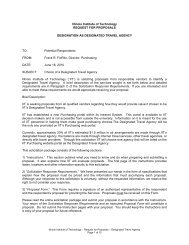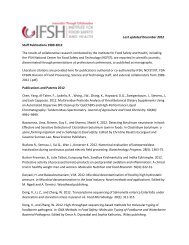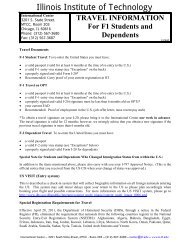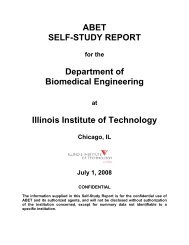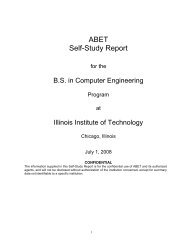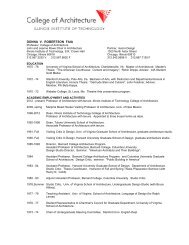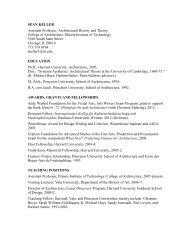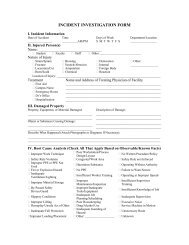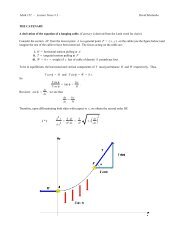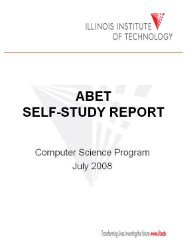Undergraduate Bulletin - Illinois Institute of Technology
Undergraduate Bulletin - Illinois Institute of Technology
Undergraduate Bulletin - Illinois Institute of Technology
Create successful ePaper yourself
Turn your PDF publications into a flip-book with our unique Google optimized e-Paper software.
Course Descriptions<br />
CHEM 236<br />
Organic Chemistry I-Lab<br />
Introduction to the major synthetic and analytical techniques<br />
<strong>of</strong> organic chemistry including the preparation <strong>of</strong> representative<br />
organic compounds from natural sources.<br />
Prerequisite(s): [(CHEM 125) OR (CHEM 126)]<br />
(0-4-1)<br />
CHEM 237<br />
Organic Chemistry I<br />
The constitution and properties <strong>of</strong> the different classes <strong>of</strong><br />
organic compounds, with considerable attention to stereochemistry,<br />
reaction mechanisms, synthetic organic and<br />
bio-organic chemistry, and spectroscopy. The laboratory<br />
work involves an introduction to the major synthetic and<br />
analytical techniques <strong>of</strong> organic chemistry including the<br />
preparation <strong>of</strong> representative organic compounds and the<br />
isolation <strong>of</strong> compounds from natural sources.<br />
Prerequisite(s): [(CHEM 125) OR (CHEM 126)]<br />
(3-4-4) (C)<br />
CHEM 239<br />
Organic Chemistry II<br />
Sequel to Organic Chemistry I. Constitution and properties<br />
<strong>of</strong> organic compounds at a fundamental level. Introduction<br />
to biological materials and synthetic polymers.<br />
Prerequisite(s): [(CHEM 235 and CHEM 236) OR (CHEM<br />
237)]<br />
(3-0-3)<br />
CHEM 240<br />
Organic Chemistry Laboratory<br />
Laboratory part <strong>of</strong> CHEM 239. Techniques for advanced<br />
organic preparations. Identification and characterization <strong>of</strong><br />
organic compounds, including modern instrumental methods.<br />
Prerequisite(s): [(CHEM 239*)] An asterisk (*) designates a<br />
course which may be taken concurrently.<br />
(1-4-2) (C)<br />
CHEM 247<br />
Analytical Chemistry<br />
Introduction to the theory and applications <strong>of</strong> analytical<br />
chemistry. Laboratory emphasis on obtaining and interpreting<br />
quantitative data. Statistical data analysis, equilibrium<br />
expressions, pH, volumetric and gravimetric analysis, fundamentals<br />
<strong>of</strong> spectroscopy, fundamentals <strong>of</strong> electrochemistry,<br />
and analytical separations. Laboratory experiments include<br />
acid-base behavior, potentiometry with ion-specific electrodes,<br />
spectroscopy (UV-visible and atomic absorption),<br />
and chromatography (ion-exchange, high pressure liquid, and<br />
gas-liquid).<br />
Prerequisite(s): [(CHEM 125)]<br />
(2-4-3) (C)<br />
CHEM 321<br />
Instrumental Analysis<br />
Theory and application <strong>of</strong> modern instruments in chemical<br />
procedures. Standard spectroscopic methods including<br />
Fourier transform infrared spectroscopy, nuclear magnetic<br />
resonance spectroscopy and ultraviolet spectroscopy. Separation<br />
techniques using high pressure liquid chromatography<br />
and gas chromatography. Other topics relevant to advanced<br />
chemical instrumentation will also be covered.<br />
Prerequisite(s): [(CHEM 247)]<br />
(2-6-4) (C)<br />
CHEM 343<br />
Physical Chemistry I<br />
Equations <strong>of</strong> state; kinetic molecular theory; temperature<br />
dependent enthalpies and heat capacities <strong>of</strong> chemical compounds<br />
and <strong>of</strong> chemical reactions; entropy and the Gibbs free<br />
energy; chemical equilibrium; phases with variable composition;<br />
solutions <strong>of</strong> charged particles; surface phenomena.<br />
Prerequisite(s): [(MATH 251) OR (MATH 252)]<br />
(3-0-3)<br />
CHEM 344<br />
Physical Chemistry II<br />
Quantum theory, molecular structure and spectroscopy,<br />
chemical equilibrium constants from statistical mechanics,<br />
phenomenological and mechanistic chemical reaction kinetics,<br />
transport phenomena from molecular perspective. The laboratory<br />
will include experiments dealing with gases, thermo<br />
chemistry, liquid solutions, phase equilibria, electrochemistry,<br />
chemical kinetics, spectra, molecular structure, and treatment<br />
<strong>of</strong> data.<br />
Prerequisite(s): [(CHE 202) OR (CHEM 247)] AND [(CHEM<br />
343 and PHYS 221)]<br />
(3-4-4) (C)<br />
CHEM 410<br />
Science <strong>of</strong> Climate Change<br />
This course will focus on the science underlying global warming/climate<br />
change. How can we continue to lead the good<br />
life while living in harmony with nature? Although obviously<br />
important, commercial/political aspects are not considered<br />
here. However, any serious debate about climate change<br />
issues eventually has to rest on the underlying scientific facts<br />
so we need to be informed. Ultimately the sun is our primary<br />
source <strong>of</strong> power. How do we responsibly access that power<br />
in the short, intermediate and long terms? Bio-fuels, carbon<br />
dioxide, polar ice caps, and solar power are some <strong>of</strong> the topics<br />
to be discussed. Class time will be divided between lectures<br />
and recitation. Permission <strong>of</strong> instructor required.<br />
Prerequisite(s): [(CHEM 124) OR (PHYS 221)]<br />
(3-0-3)<br />
CHEM 415<br />
Inorganic Chemistry<br />
In-depth introduction to the vast subfield <strong>of</strong> the discipline<br />
dealing with all <strong>of</strong> the elements in the periodic table. Presents<br />
balanced blend <strong>of</strong> facts and theories in modern inorganic<br />
chemistry. Emphasis is on bonding, electronic, magnetic, and<br />
structural features exhibited by inorganic and organometallic<br />
compounds and their reactivities. Modern concepts including<br />
symmetry and group theory and their relevance in solving<br />
chemical problems. Bioinorganic chemistry and high tech<br />
inorganic materials and solids are introduced.<br />
Prerequisite(s): [(CHEM 239)]<br />
(3-0-3)<br />
CHEM 416<br />
Advanced Chemistry Laboratory<br />
An advanced laboratory with emphasis on synthesis and<br />
characterization <strong>of</strong> inorganic and organometallic compounds.<br />
Prerequisite(s): [(CHEM 240 and CHEM 415)]<br />
(1-7-3) (C)<br />
CHEM 434<br />
Spectroscopic Methods in Identification & Analysis<br />
Characterization and analysis by mass, vibrational, nuclear<br />
magnetic resonance, and electronic spectroscopy.<br />
Structure-spectra correlations applied to organic and inorganic<br />
compounds with examples drawn from diverse<br />
areas, e.g., pollutants, toxic materials, polymers, etc. The<br />
laboratory work includes characterization <strong>of</strong> prepared or<br />
separated organic compounds by chromatographic, chemical,<br />
and spectroscopic methods.<br />
Prerequisite(s): [(CHEM 240 and CHEM 247)]<br />
(3-4-4)<br />
CHEM 450<br />
Introduction to Research<br />
Required for chemistry majors. Designed to give research<br />
experience in a faculty research laboratory.<br />
(0-8-3) (C)<br />
206



